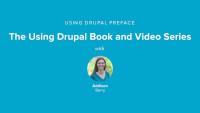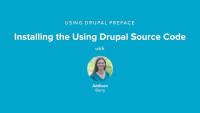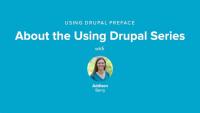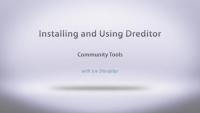Drupal 8: New Multilingual Features
Blog postLast week I was in Dublin for Drupal Dev Days. While my main activity was conducting a Community Tools workshop on the Friday of the camp, I was there the whole week, while an intrepid team of people have been meeting up at the venue in the final sprint to the Drupal code freeze, which was on Monday, July 1st! (Holy cow!) One of the groups who has been plowing ahead at full steam is the Multilingual team. I even got to help out with some wording in one of the issues someone was working on.
In this lesson, we are going to see how the book relates to each of the series we have, and how each of the individual series are organized. We will end up with thirteen series to cover the entire book. Then we will take a look at how you should use the videos with the book. If you don't have the book, not to worry, as the book would only act as supplementary material to the video lessons. You don't need the book to successfully follow these series. If you do have the book however, we want to make sure you understand how the lessons and book relate to each other.
Additional resources
Using Drupal comes with source code intended to be used throughout the lessons to make following the lessons much easier. In this lesson we're going to take a look at what that source code provides for us, where we can get a copy of, and how to use it. We'll go through the installation process, as well as see how we can switch between chapters in the source code without destroying work you've done on previous chapters. It is important to note that using the source code is very important if you want the lessons to match what is in the lessons. Drupal modules can change a lot over time, and the source code is designed to exactly match what is covered in the lessons. Once you've learned the basics of a chapter by working through the source code, you can upgrade your modules and explore the differences in newer versions, with the base understanding you've gained from the lesson.
Warning: Since this Drupal code is several years old, you must use PHP 5.3. PHP 5.4 or higher will not work. You will need to make sure your server is using PHP 5.3 in order to use this code properly. Many all-in-one servers, like WAMP, MAMP, and XAMPP provide older versions of PHP and a way to switch back and forth between versions.
Additional resources
The Using Drupal series of lessons walks through the O'Reilly book, Using Drupal, written by Angie Byron, Addison Berry, and Bruno de Bondt. We use the second edition, which covers Drupal 7. The book starts off with taking a look at Drupal Core and then works through various case studies using a wide range of contributed modules from the Drupal project.
The video series follows along with what's in the book, so if you have the book, the videos are really great supplemental material. Even without the book, you’ll get the full lessons here in the videos.
This series is intended for people who have worked with the web and understand how a website gets delivered, and in particular, how to get a website onto a web server so that people can actually see it and use it. The rest of this introductory series we have here will look at how the book relates to the video series we're going to be creating, and how you can use those 2 together.
Additional resources
Using Drupal Book in Video Lessons
Blog postMany moons ago, back in 2008, several Lullabots wrote the first edition of Using Drupal, published by O'Reilly Media. In 2012, myself and Angie Byron, with the help of Bruno DeBondt, updated Using Drupal with a second edition for Drupal 7. This year we're happy to announce the video version of Using Drupal.
 In the latest podcast episode, BDD, Behat, and Drupal, the Drupalize.Me team is joined by Melissa Anderson (eliza411) to talk about Behavior-Driven Development (BDD) and using a testing tool called Behat.
In the latest podcast episode, BDD, Behat, and Drupal, the Drupalize.Me team is joined by Melissa Anderson (eliza411) to talk about Behavior-Driven Development (BDD) and using a testing tool called Behat.
Oscon Can Be Worth the Investment
Blog postIn a few short weeks I'll be headed on the road once again for two great events: Twin Cities DrupalCamp and OSCON. On the surface these two events couldn't be more different. One is intimate, inexpensive, and full of Drupal. The other is big, an investment, and has hardly any Drupal. Seems like an obvious win for Twin Cities DrupalCamp, right? Well, let's dive a little deeper into what makes OSCON worth the price tag.
Setting up Your Developer Environment
Blog postIn my new position at Drupalize.Me I have the luxury of helping a lot of projects in little ways. Being able to context switch quickly helps a lot. This means I've put a lot of time into how my workstation is setup so that I can easily move from one project to another. With the new job I also decided to add OSX to the mix of computers that I use on a daily basis.
 In episode 20 of the Drupalize.Me podcast, we're fortunate to be joined by guest Chris Eppstein, the creator of Compass, and part of the core Sass team. We also have three Lullabot front-end developers on the podcast, Micah Godbolt, Kris Bulman, and Carwin Young.
In episode 20 of the Drupalize.Me podcast, we're fortunate to be joined by guest Chris Eppstein, the creator of Compass, and part of the core Sass team. We also have three Lullabot front-end developers on the podcast, Micah Godbolt, Kris Bulman, and Carwin Young.
A month or so ago the Drupalize.Me team started a discussion on how to start helping others learn Drupal 8. We knew Drupal 8 wasn't ready for our typical curriculum and video production process, but thought you would be interested to learn along with us about Drupal 8 as it continues to evolve. This blog post is the kick off to that series. As we stated in a recent podcast where we announced this idea, we need everyone to understand that the things we discuss are still in development and could change, or even be removed from D8 altogether.
During the week June 24th a mass of Drupal folks will converge on Dublin, Ireland for Drupal Dev Days. This year, in addition to the three days of DrupalCamp that is happening (June 28-30), there is also a week of sprints leading up to the camp, and to the Drupal 8 code freeze deadline. This is it. If it's going to be in Drupal 8, it needs to happen before the end of June.
See You at Drupalcamp Austin
Blog post We're pleased as punch to be sponsoring DrupalCamp Austin in Austin, Texas from June 21st through 23rd. This year's camp is packed, with one day of all-day workshops, several half-day workshops, three tracks of sessions over two days, and two keynotes.
We're pleased as punch to be sponsoring DrupalCamp Austin in Austin, Texas from June 21st through 23rd. This year's camp is packed, with one day of all-day workshops, several half-day workshops, three tracks of sessions over two days, and two keynotes.
We'd Like to Sponsor Your User Group
Blog postWe're happy to announce a new program to sponsor user groups around the world: Meetup Memberships. We're giving user groups FREE access to the entire Drupalize.Me library on days that you have meetups or camps planned. It's like having a Drupalize.Me instructor show up at your event, anywhere, anytime! Here's how it works:
 In this podcast episode, Building Lullabot.com, Addi is joined by the Lullabot team that worked on the new Lullabot.com redesign and upgrade. The conversation covers a lot of the lessons learned from doing an internal project on the side of regular client work.
In this podcast episode, Building Lullabot.com, Addi is joined by the Lullabot team that worked on the new Lullabot.com redesign and upgrade. The conversation covers a lot of the lessons learned from doing an internal project on the side of regular client work.
NOTE: Support of Dreditor has been nominal for a while. It's still the preferred tool for enhancing Drupal's issue queue, but keeping track of what the "official" version is can be tricky. For now, we recommend https://dreditor.github.io/. There's also been work happening to incorporate many of Dreditor's features right into Drupal.org itself. See https://www.drupal.org/project/drupalorg/issues/1673278
Dreditor is a great community tool that assists with things like patch reviews, and generally interacting with the Drupal.org issue queue. Dreditor is not a Drupal module, but is a plugin script you use in your browser. In this lesson, Joe walks through how to get Dreditor installed (on Chrome and Firefox), and then shows you how to use it to make your work in the issue queues more efficient.
Additional resources
On the eve of DrupalCon Portland, we're happy to be able to get another free community video out, Installing and Using Dreditor. What's more exciting though, is that this video is part of our Community Tools workshop, and in an effort to spread Drupal community involvement further than where we can show up to run this free workshop, we're putting all of our materials and notes online for everyone to use freely, with the Community Tools curriculum.



